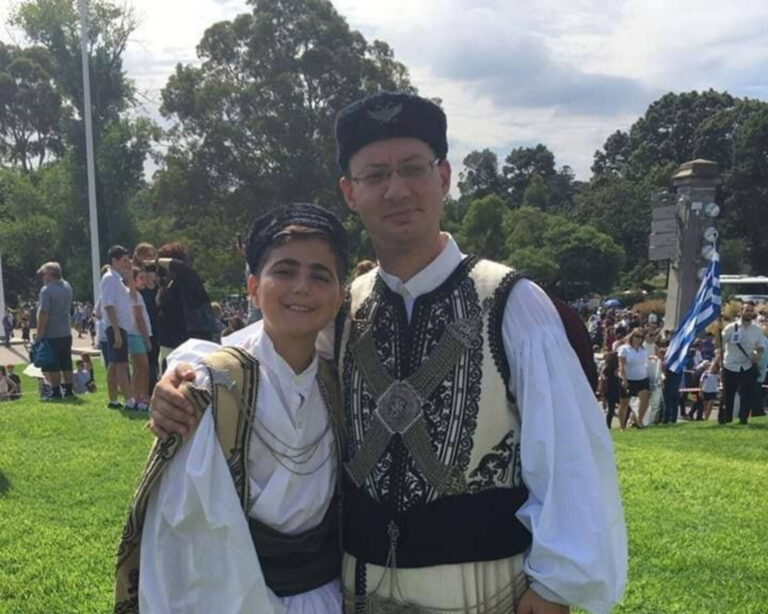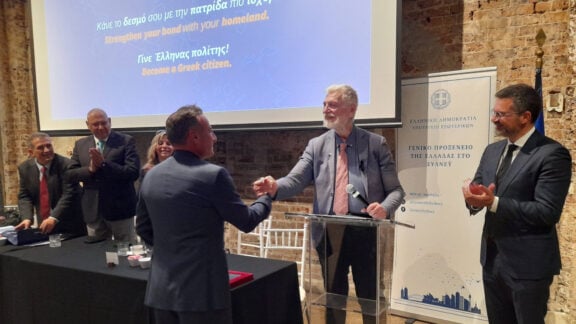A few days before the march commemorating Greek Independence Day was to take place, I received the following text message: «Γεια σου θείο. Μπορούμε να έρθω στην παρέλασι το Κυριακή;». I answered in the affirmative, and as I am wont to do, resent the message with the correct spelling and grammar, highlighting the areas where further revision was required.
The sender of the message was my nineteen year old nephew Ramel, who is Assyrian, although he reliably informs me that my mother in law took a DNA test in which it was revealed that she is seventeen percent Greek, making him at least a member of the tribe as to four percent.
In preparation for the march, Ramel was not content just to try the national dress of Epirus for size. He peppered me with questions as to how and why the costume differed from region to region, what the significance of the embroidery was and what function each component of the costume played. He was considerably taken with the kiousteki, which bore an image of Saint George and we spoke about the important role that Saint has historically played in both our cultures. Then his questions turned to the manner in which the Greek Revolution unfolded in the various regions of Greece, seeking information about the differences, along with the commonalities.
Ramel is no stranger to the march. He is in fact a veteran, having attended a number of parades in full regalia ever since he was a young boy. Back then, his favourite pastime was to assume a fierce hoplarchic expression while proudly pointing a replica flintlock pistol at the dignitaries as he marched past. In those heady days, when as an uncle I was variously considered “funny” and “cool” (in his defence, he was quite young) he proudly wore the costume that I wore as a boy. Now my son wears it and he too aims the same replica pistol at the dignitaries, proving correct the old Greek adage: «το αίμα νερό δεν γίνεται».
Seeing my nephew and his brothers don the Epirus costume so enthusiastically and march down towards the Shrine unself-consciously, without complaint and a large amount of pride made a great impression upon the Greek section of my family who could not understand why there was no consternation expressed over the fact that they were in effect wearing dresses and indeed, instead of being disconcerted about this or embarrassed, were actually enjoying themselves. Back then, I put this down to their affinity with their uncle. However, now Ramel is all grown up and poised to enter Medical School and after two decades of hearing the same anecdotes over and over again, my humour, such that it is, no longer has the spontaneity it once may have had.

The warning signs were there from the beginning though. The lullaby I used to sing to my daughter as a baby was the traditional song Malamo. Unless I held her in my arms and danced the actual dance, she would refuse to sleep. I would sing the song again and again, almost falling asleep myself and forgetting the lyrics until a soft voice would come from the other side of the room: «κι αν σου τσακίσω το σκαμνί» adding the part that in my sleep deprived stupor, I had forgotten. This was Ramel, who unbeknownst to me and just by listening, had learnt the whole song off by heart. He would go on to learn and reproduce much of my vocabulary and idiomatic expressions, until such time as I felt it necessary to take him aside and to explain to him that: «άι στο διάολο» should not be repeated in polite company.
I also had to explain that it was probably not a good idea for him to call me «ρε» for by this time he had joined a local Greek soccer team and his vocabulary of expostulations had grown exponentially, causing me to give him a crash cause in the polite and the profane registers. Some time later Ramel informed me that he had decided to study Greek at his high school and henceforth our interactions were about grammar and pronunciation as well as arguments still unresolved, such as whether the word ταύρος is Indo-European, or in fact a Semitic loanword, for the same word appears in ancient Assyrian as well.
Of a sensitive and devout nature, having felt he had grasped the basic rudiments of the language, Ramel began to read the Bible in Greek. He particularly enjoyed the Psalms and recall to this day how he made my hair stand on end during a family function, where, in the midst of a conversation with his father about Trump being a harbinger of the end of the World, Ramel began to chant with perfect Byzantine intonation, the 135th Psalm: «Ἐξομολογεῖσθε τῷ Κυρίῳ, ὅτι ἀγαθός…» What? How? I spluttered. “That’s nothing,” he smiled. “Listen to this…” and he began to chant «Ἀγνή Παρθένε Δέσποινα», going to explain the circumstances in which Saint Nektarios composed the hymn, analysing the lyrics and describing how the life of the Saint had inspired him during various times in his life.
It was at that point that our relationship changed. By this time, while studying for VCE, Ramel was scouring the Church Fathers in the original Greek and peppering me with questions as to how the Assyrian theological terms qnume and kyana relate to the Greek ὑπόστασις and φύσις and to what extent πρόσωπον and its derivative parsopa mean the same thing. Then there was the time that he messaged me at a rather ungodly hour to discuss the incongruity of Christ’s observation “its easier to pass through the eye of the needle.” In particular, he explained to me that in Aramaic, the primary language of Jesus, the word for camel, gyumla, sounds like the word for rope (gimla). This is used as an argument that the Bible was first written in Aramaic as for those who maintain this, to say “its easier for a rope to pass through the eye of a needle” is more consistent imagery. Compounding this, there is the Greek word for camel κάμηλος and the old Greek word for naval rope (κάμιλος) which sound exactly the same. It was at this point that I decided to refer to the need for him to concentrate on his exams, introducing him to a rather erudite Greek expression that goes something like this: «Βάλε κώλο και διάβασε».
On the way to the National Day march, Ramel insisted upon playing us a hymn to the Byzantine General Belisarius. I was not at all sure what the relevance of the Justinianic general to Kolokotronis, Karaiskakis and the Panimian Brotherhood of Victoria until Ramel explained to me that in many ways, the Revolution picked up where Belisarius left off, restoring the ancestral lands that granted a people their primary identity, back to them. I did not have the heart to insist upon Zafeiris Melas instead.
Marching proudly down Birdwood Avenue, holding his Souliote rifle, Ramel was adored by the elderly spectators who cannot resist a strapping young man in a skirt bearing arms. To their acclamations he enthusiastically shouted «Χρόνια πολλά!» and «Ζήτω!» before turning to me to ask if there were any other responses he could use. I suggested: «Προλετάριοι όλων των χωρών ενωθείτε!» but I received some especially dark looks from the ladies marching behind us and we proceeded as if that unfortunate incident had never taken place. Instead, Ramel began to teach the other members of our motley band of Epirots assorted Assyrian phrases, mostly relating to the consumption of foodstuffs, for by this time, we were all ravenously hungry.
Having received a blessing from Metropolitan Ezekiel moments before, Ramel was in such high spirits that he didn’t notice when we had marched past the dignitaries and that the parelasi was over. He made us all sing the Greek national anthem over and over again in the car on the way home, instructing me: «κλείσε την πόρτα» so that the door did not close over his foustanella, an occupational hazard unique to the Greek-Australian, but also to the hybrid Greco-Assyrian-Australian as it turns out.
“You know what draws me to the parelasi?” he turned to me suddenly, adopting a pensive pose. “I know,” I smiled sadly, “but go ahead.”
“I can’t celebrate my own people’s Independence Day. Instead, for us it is massacre after massacre, genocide after genocide. Sometimes I think we will never be free. But then I see what you people did against all odds, and how you keep the memory alive until today, I know that anything is possible. Your liberation is the liberation of all of us. I just wish that one day, you will be standing beside me when we celebrate Assyrian Independence.”
Sending him on his way, he wished me: «και του χρόνου». Between you and I, I can’t wait.








